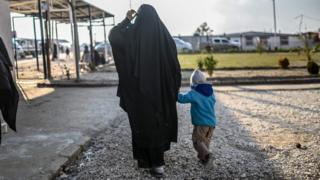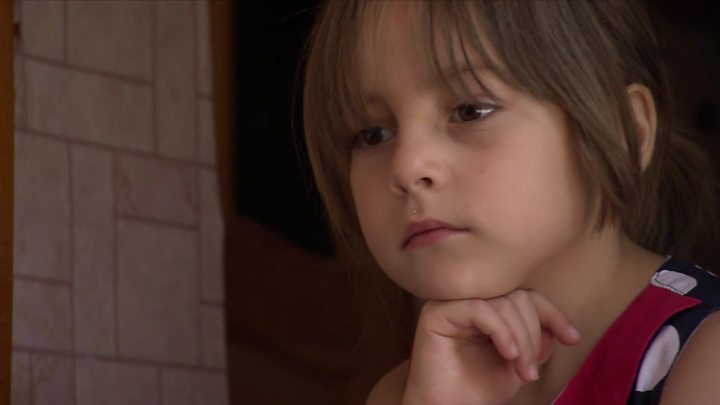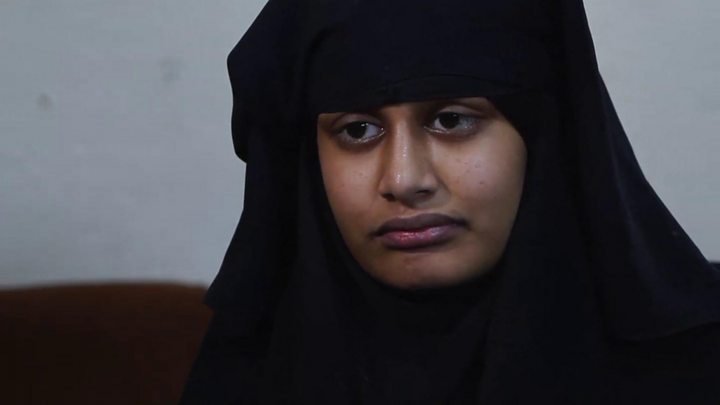Islamic State: Thousands of foreign children in Syrian camps
 Image copyright AFP Image caption A French woman walks with her child in a camp in northern Syria
Image copyright AFP Image caption A French woman walks with her child in a camp in northern Syria
Thousands of children from around the world remain trapped in Syria facing an uncertain and dangerous future, a charity has warned.
Save the Children says it has found more than 2,500 children from 30 countries in three camps alone.
They are being held away from the camps' populations, in segregated areas with foreign women believed to be former Islamic State (IS) members.
The warning comes as the debate over what to do with these children rages.
The issue was brought to the fore after a number of women came forward to say they regretted their actions and wanted to return to their home countries, including the UK, US and France, so they could raise their children in peace.
In response, the UK and US have barred two mothers from returning. But what does this mean for their children, and the thousands of others - some just days old - caught in an international battle?
For many, it is clear.
"There is a moral responsibility for every country to take these children back," Usama Hasan, head of Islamic Studies at Quilliam International. "It is a moral duty."
How many children are there?
It is not known exactly how many children there are. According to a 2018 report from the International Centre for the Study of Radicalisation (ICSR), at least 3,704 foreign-born children were taken to IS territory by their parents or carers, including 460 from France, at least 350 from Russia and almost 400 from Morocco.
Several hundred of these children are known to have returned to their home countries since. A number are likely to have died in IS territory.
Image caption A map showing the verified origin countries of children who travelled to Iraq or Syria
But, as the stories of the UK's Shamima Begum and US woman Hoda Muthana show, many of the women and men who went out to Syria and Iraq have had children since they arrived.
The ICSR said in July it had verified the births of at 730 children from 19 countries. However, other unverified reports put that figure at closer to 5,000.
Where are the children of IS members now?
It is hard to say where exactly all the children are now. For a start, they are spread over at least two countries: Syria and Iraq.
The situation in the camps in northern Syria is particularly dire, Save the Children points out. For a start, because these children are held in isolation with other perceived former members of IS, they are often not able to get as much food and medical care as they need.
But more than that, reports from inside the camps paint a grim picture of intimidation and fear.
"We thought we could put them [the foreign women] together with the Syrians and the Iraqis, and that they would adapt," the director of a Kurdish camp in northern Syria told France24 in February.
"But they're ferocious, they burned some of the Syrians' tents, they would call them cockroaches, infidels. They consider themselves as the only true Muslims. So we had to separate them."
These "ferocious" women continue their reign of terror in the segregated area: the journalist is later shown the remains of a burnt-out tent.
"A child died," one foreign woman explained to the camera, picking up the burnt remains of the canvas.
Image copyright AFP
Meanwhile, foreign children as young as nine are finding themselves in front of the courts in neighbouring Iraq, while hundreds of others are known to be being held in prison with their mothers as they are tried for their roles in IS.
It all adds to a sense of urgency to calls to countries to repatriate the children as quickly as possible.
"All children with perceived and actual associations with Isis [IS] are victims of the conflict and must be treated as such," Kirsty McNeill of Save the Children UK argues.
What are countries doing to get them back?
Very few foreign children have been repatriated so far. But while there are obstacles to bringing children back, like identification, governments across the world have been accused of stalling in order to avoid having to make difficult decisions.
Meanwhile, numerous families still living in their home countries around the world have offered to take children in.
In Russia, more than 100 children have already been brought home to family members, many at the request of parents locked in prisons. The last flight brought back 30 children, and Russia plans to bring back another 40 this month.
Tanya Lokshina, Human Rights Watch associate director for Europe and Central Asia, told Bloomberg at the start of February it is "the most active programme to return detainees from Iraq and Syria".
But in other countries, families face a battle to get their grandchildren, or nieces and nephews, home from Syria an Iraq.

Media playback is unsupported on your device
Media captionThe story of how one father rescued his daughters from IS
In Belgium, a woman called Fatiha told the Washington Post she was ready to take in her six young grandchildren.
However they remain in a camp in northern Syria, at the centre of a court battle, as the Belgian government tries to block their mothers returning.
Like a number of other countries, including Russia, Belgium has said it is happy to take young children back - but not necessarily their parents.
UK Home Secretary Sajid Javid suggested Britain - which, according to ICSR, had only seen the return of four children by July 2018 - might follow a similar policy when he noted the revocation of Ms Begum's citizenship would not apply to her newborn son.
"Children should not suffer, so if a parent does lose their British citizenship it does not affect the rights of their child," he said.
But Save the Children warns that separating the children from their mothers can also be damaging.
"We believe the best interests of the child are paramount, and this means a child and mother should remain together whenever possible," Ms McNeill said.
Countries are beginning to change their positions. France was just repatriating children on a case-by-case basis, but says it is now considering taking IS members back to be dealt with at home.
Are there any dangers in returning children?
Possibly, says Gina Vale, the co-author of the ICSR study.
"Minors, specifically boys, have undergone both psychological indoctrination and intensive military and combat training within IS territory from a very young age," she points out.
However, any concerns would have to be dealt with on an individual level. What's more, she warns that not bringing the children back may be worse in the long term.

Media playback is unsupported on your device
Media captionShamima Begum: 'I got tricked and I was hoping someone would have sympathy with me'
"For both IS-born infants and older children once associated with the group, stigmatisation and isolation from society may lead to potential disenfranchisement and grievances, which, if not effectively addressed, have the potential to fuel radicalisation of vulnerable individuals in the future," she said.
"It is imperative that foreign governments, including the UK, uphold their duty of care to their citizens and adopt a human rights-based approach to their repatriation and rehabilitation.
"Without this, there is an acute risk of continuation or even exacerbation of the cycle of jihadist violence, radicalism and instability for generations to come."
Netflix renewed its hit British series 'Sex Education' for season 2, and shared some details
Netflix has renewed its hit British series, "Sex Education," for a second season, set to start filming this spring in the UK. Season two will have eight episodes.
The series has gained critical acclaim since it debuted in January, and the first season has a 91% Rotten Tomatoes critic score. It's also a hit with audiences. Netflix said during its most recent earnings report that the show was expected to be viewed by 40 million households in its first four weeks.
Netflix describes the series like this: "Insecure Otis has all the answers when it comes to sex advice, thanks to his therapist mom. So rebel Maeve proposes a school sex-therapy clinic."
READ MORE: 7 great Netflix original TV series that show how well its British strategy is working
It's the latest British series to be a win for Netflix. The streaming giant has built a library of critically acclaimed and crowd-pleasing British shows by partnering with networks and production companies in the UK.
Those shows include"Bodyguard," which won a Golden Globe last month for best actor in a drama series; "The End of the F---ing World," which was also renewed for a second season last year; and "The Last Kingdom," the third season of which debuted in November. These shows gain more of an audience once available on Netflix, and can pull in more subscribers for the company.
"Sex Education" is different, though, as it didn't originate on a British TV network and is purely a Netflix original production, with a mostly international cast.
Netflix said Gillian Anderson, Asa Butterfield, Emma Mackey, Ncuti Gatwa, Aimee-Lou Wood, Connor Swindells, Kedar Williams-Stirling, Tanya Reynolds, and Patricia Allison will reprise their roles in season 2.
Netflix will increase the amount of European shows it produces in 2019 by a third, The Telegraph reported in November. The move comes on the heels of the head of the UK's broadcast regulator pushing British networks to create a streaming service to compete with Netflix, according to The Telegraph.
NYFW: Laverne Cox Stars in First Fashion Show for Size-Inclusive E-tailer 11 Honoré
STYLE
6:00 AM PST 2/8/2019 by Laurie Brookins
It’s fitting that the first look out at Wednesday night’s 11 Honoré show was a side-draped tuxedo gown in white by Christian Siriano. Less than 24 hours before, Democratic women in Congress created a compelling visual: A sea of solidarity in white at Donald Trump’s State of the Union speech.
With its roots in the early-20th century British suffrage movement, and more recent memories of Hillary Rodham Clinton wearing a white Ralph Lauren suit when accepting the 2016 Democratic nomination, all-white as a sartorial choice has become the ultimate power statement, this decade’s version of I-am-woman-hear-me-roar. And when it comes to high-end fashion, plus-size women are demanding to be heard as well.
“It was the right time,” said Patrick Herning, founder and CEO of the Los Angeles-based multi-brand luxury e-tailer that specializes in sizes 10 to 20 and up. “We’re approaching two years of being in business, and our job is to put a spotlight on this conversation. There’s no better place for us to do that than New York Fashion Week.”
It is widely publicized that about 68 percent of American women wear a size 14 or larger.
Herning enlisted Hollywood stylist Elizabeth Stewart (a champion of size-inclusivity, whose clients include Viola Davis, Julia Roberts, Cate Blanchett and Gal Gadot) to style the retailer’s debut runway presentation for fall 2019 at New York’s Spring Studios. Calling Herning “a game-changer,” Stewart told The Hollywood Reporter that her role was to create a show that felt “the same regardless of anyone’s size: glamorous, elegant and fresh.”
Herning added: “I’ve known Elizabeth for about 10 years. She understands this customer super well. She believes in empowering all women, regardless of size, and I just really trust her.”
Positioned as a see-now, buy-now event – a booklet on each seat featured sketches of every design, with handy QR codes to take you straight to that style on the 11 Honoré site – the show featured more than three-dozen looks from designers that included Jason Wu, Roland Mouret, Zac Posen and Tanya Taylor. Adam Lippes and Yigal Azrouel were on the front row to watch their designs walk the runway.
“Anything that helps to empower women is an amazing feeling,” Azrouel said after the show. “These were all beautiful women on this runway; if you’re offered the chance to do something that feels high-fashion regardless of size, why not?” Stewart agreed: “Fashion lovers come in all shapes and sizes, and it is important that the industry recognizes and supports that."
Tess Holliday is a plus-size model who has appeared in Nylon, Vogue Italia and Marie Claire’s U.K. edition; on the front row Wednesday, she wore 11 Honoré pieces by Mara Hoffman and Sally LaPointe. “No one is doing what Patrick is doing, and he’s doing it because he genuinely cares that plus-size women don’t have accessibility to fashion,” she said. “He took his relationships with designers and turned it into a way to help other people.”
Indeed, faced with the challenge of red-carpet dressing when designers can’t or won’t craft a custom dress, plus-size actresses have been turning to 11 Honoré for assistance. Another Stewart client, Rebel Wilson, recently wore a look from the site to October’s Veuve Clicquot Polo Classic, while Melissa McCarthy donned Reem Acra’s star-embellished purple georgette caftan gown ($3,950) to January’s Golden Globes. At Monday’s 91st Oscars Nominees Luncheon, McCarthy wore Jonathan Simkhai’s $545 navy jacquard V-neck ruffle dress, an 11 Honoré exclusive.
Several looks on the runway felt tailor-made for upcoming red carpets, from that $5,400 white Siriano tuxedo gown to a $4,595 one-shoulder black Chantilly lace gown by Monique Lhuillier. At the other end of the price spectrum, Badgley Mischka’s scuba-style gown with a dramatic ruffle on the deep-V neckline and high slit was a veritable bargain at $595.
For the finale, Herning had one more surprise in store: Laverne Cox, who worked the runway in a custom Zac Posen tulle gown that’s not yet on the site but is available for pre-order. “That was arguably one of the most important moments of my career,” Herning said of the trans actress’ appearance at the show’s end. “I’m a gay founder, I support the LGBTQ community, and all women are incredibly important to me. To see such a strong, beautiful, powerful woman closing the show--I couldn’t ask for anything more.”
No comments:
Post a Comment